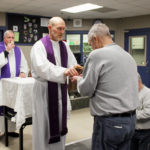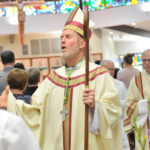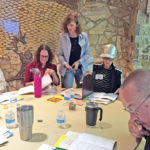By Elizabeth Starr
The Catholic Messenger
DAVENPORT — While the Diocese of Davenport was preparing for its Vision 20/20 Convocation, the Catholic universities in Iowa held their own conference called Connections to teach members of the faculty and staff at those institutions about Catholic intellectual tradition.
Organizers chose the title in hopes of building connections between disciplines and institutions, and between the different parts of Catholic intellectual tradition.

Father Thom Hennen, chaplain at St. Ambrose University, participated in the conference held May 28-29 at Mount Mercy University in Cedar Rapids. He said it’s hard to define Catholic intellectual tradition succinctly. However, he shared several themes from the conference that incorporate the tradition:
• Commitment between faith and reason and its importance for college students.
• Respect for the communal wisdom of the past.
• Anti-elitism and the idea that knowledge is not just for the privileged few.
• The integration of the tradition into life as a whole.

Maureen Baldwin, dean of Student Academic Services at St. Ambrose, described the conference’s focus as bringing together faith and reason in the love of education. Catholic intellectual tradition, she said, has been present at St. Ambrose “even without use of the terminology.” The students manifest the ideas through their courses and even in late-night conversations. The faculty and staff, Baldwin says, show the tradition by “taking time to find where students are on their journey” and by “ensuring we are working with them toward their goals.”
 St. Ambrose associate professor in social work Kristi Law defines Catholic intellectual tradition “as a way to view the world that encourages critical thinking and questioning,” centering around human dignity. As a participant in the conference, she enjoyed examining how “Catholic universities might be able to work with marginalized communities to achieve justice, in addition to service for others.”
St. Ambrose associate professor in social work Kristi Law defines Catholic intellectual tradition “as a way to view the world that encourages critical thinking and questioning,” centering around human dignity. As a participant in the conference, she enjoyed examining how “Catholic universities might be able to work with marginalized communities to achieve justice, in addition to service for others.”
Catholic intellectual tradition, Baldwin says, can be applied through being intentional, humble and showing respect for others.
Fr. Hennen said, “At St. Ambrose we have this idea of ‘what it means to be an Ambrosian.’” An Ambrosian is a person who is formed, thinking, committed, a loving neighbor, a person who is not so caught up in the world and a better human being because of their experiences at St. Ambrose. As an example, he recalled a student who worked hard in the classroom while participating in track, band, campus ministry and regularly attended Mass. Catholic intellectual tradition reinforces what it means to be an Ambrosian, the priest said.
Fr. Hennen, Law and Baldwin said they would recommend the conference to colleagues. Fr. Hennen hopes conferences such as Connections will be offered in the future. With enough interest, he said it could easily be an annual event.
Representatives attended from six Catholic universities in Iowa: Loras College, Clarke University, St. Ambrose University, Mount Mercy University, Mercy College of Health Sciences and Briar Cliff University.
The biggest benefit from the conference, Fr. Hennen said, is that faculty – who may or may not be Catholic – come and learn about Catholic intellectual tradition. “Then they know about it and can get behind it.”
The conference’s closing prayer, adapted from a prayer by the late Bishop Ken Untener, included this excerpt: “This is what we are about: We plant seeds that one day will grow. We water seeds already planted, knowing that they hold future promise. We lay foundations that will need further development. We provide yeast that produces effects far beyond our capability” (The Collegium Prayer Booklet).











